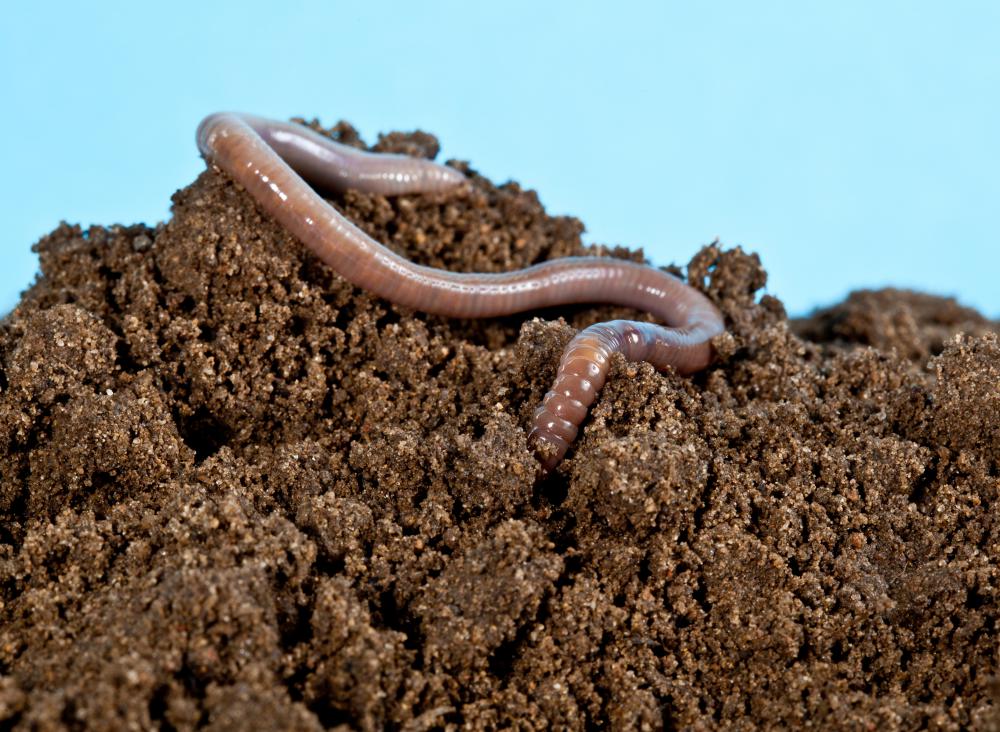At WiseGEEK, we're committed to delivering accurate, trustworthy information. Our expert-authored content is rigorously fact-checked and sourced from credible authorities. Discover how we uphold the highest standards in providing you with reliable knowledge.
What are Earthworm Farms?
Earthworm farms are watertight containers filled with composting worms and garden soil. These farms are used to dispose of organic waste in a way that is beneficial to the environment. Organic matter, such as household table scraps, can be fed to the worms. In return, the worms create nutrient-rich soil that can be recycled for lawn and garden use.
The purpose of earthworm farming is to dispose of organic waste in an efficient and environmentally friendly way. Feeding certain table scraps to the worms can reduce household waste, which saves money and helps reduce landfill overflow. In addition to disposing of organic waste, the worms help create rich and fertile soil. This healthy soil can be recycled for lawns and gardens.

Only certain types of earthworms are appropriate for earthworm farms. Common worms found in lawns and gardens do not grow or compost well in a farm. Eisenia foetida is the species of composting worms that is considered best for use in earthworm farms. The common names for these worms include red wigglers, European nightcrawlers, redworms, brandling worms and tiger worms.

Earthworm farms are not large in size. The worms live in stackable bins where they eat waste and reproduce in soil. An earthworm farm can be small enough to carry and can be made of plastic or wood, as long as the container is watertight. The earthworm farms thrive best in shady or dark areas, far away from heavy vibrations.
Starting an earthworm farm requires a watertight container with holes on top for ventilation. First, the container should be lined with newspaper and organic waste such as crushed eggshells. Moist garden soil and earthworms can then be added. Tending to an earthworm farm is fairly simple, because the earthworms need no encouragement to eat and reproduce.
Although an earthworm farm is considered low maintenance, occasional problems can arise. If the worms begin to die, the farm might be too hot and should be placed in a cooler area. If the worms try to escape, the soil should be moistened. A smelly earthworm farm means that the worms are being fed too often, and there still is residual food that needs to be consumed before new food is added.
Only certain types of organic waste should be fed to the earthworms. The best foods for earthworm farms are bread, eggshells, teabags, coffee grounds, vegetables and paper. Although fruit is also good for earthworm farms, citrus waste should not be used, because it is harmful to the worms. Meat, dairy products, onions and manure also can be harmful to earthworms and should be avoided.
AS FEATURED ON:
AS FEATURED ON:












Discussion Comments
@MrsPramm - They might be special kinds of worms though. If anyone is hoping to do this at home they need to pay special attention to what kind of worms are recommended in a small scale, domestic worm farm and what should be fed to them.
You might think that it doesn't make a difference, because they would be able to get all of this stuff in the "wild" but earthworms in the wild can be picky because they have more choice. The ones in your worm farm can only eat what you give them to eat, and often the farms are fairly overstocked so they will need quite a lot of feeding.
Treat it as a serious undertaking, or make a compost bin instead. Compost doesn't care if you ignore it or give it the wrong conditions. It might not work well, but that's your own fault. Earthworms are living things and they should be cared for if you're going to confine them and expect them to work for you.
@pastanaga - There might be somewhere near you that keeps pigs or earthworms or even just a compost heap that you could give your scraps to.
Worm farms are definitely a good thing for the modern kitchen though, as they are the easiest way for people to quickly recycle their food waste. I've even heard of industrial size worm bins on farms that can take care of animal carcasses (although I don't think they can then use that material directly on food plants).
You absolutely have to keep the farm watertight. My housemate attempted a worm farm a few months ago and he didn't replace the lid properly one night.
Unfortunately for the worms, it rained a lot that night and their container filled up with mud and they all died. Worms need relatively dry soil or they won't be able to breathe.
He didn't even realize what had happened for a while. It was shame too, because he had spent quite a lot of money on getting the worms and the container and everything and it was nice to think that our vegetable scraps weren't being wasted.
Post your comments